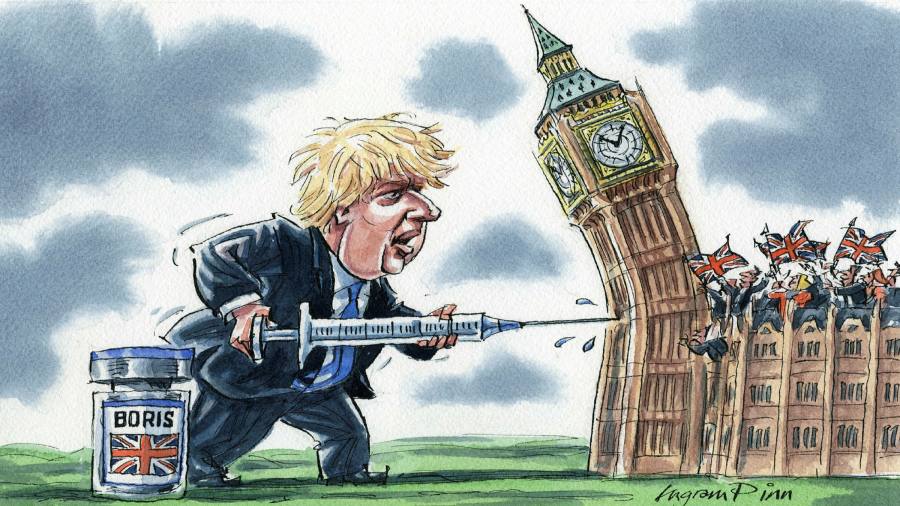[ad_1]
It’s not how you start; it’s how you finish. The clear success of the UK’s vaccine rollout and the contrast with EU missteps on its scheme leave Boris Johnson’s Conservatives increasingly confident that his government will emerge from the pandemic far stronger than its numerous errors should permit. Reaching for the wartime metaphors which come so instinctively, one former party strategist adds: “When you’ve got D-Day, no one remembers Norway.â€
Tories knew the vaccine would lift the national mood. But they also saw last month’s grim landmark of 100,000 Covid casualties, a statistic made more shocking when one considers that more than half those deaths occurred since November.Â
Yet Mr Johnson can celebrate the UK’s vaccine programme and depict it as a validation of Brexit. Remainers will quibble but few can doubt the political fallout had his decision to opt out of the EU vaccine scheme gone the wrong way.Â
Things can still go wrong — virus mutation for one — but Mr Johnson is showing the renewed confidence that breeds authority. His approval ratings are recovering, especially among Tories. Talk of a leadership challenge has slowed to a dribble.
But this latest great escape in a preposterously Teflon career offers a second chance for Mr Johnson’s premiership only if he learns the right lessons. BoJo may have regained his mojo but that is precisely when his government is most prone to mistakes.
One wrong lesson would be succumbing too quickly to the desire and pressure to return to normal again, easing lockdown restrictions further and faster than is prudent.Â
Another error would be seeing the vaccine task force as a model for all future problems. Agility and outside expertise must be part of the mix, but this is not a one-size solution. Success also depended on NHS planning to deliver the jabs. Equally Mr Johnson’s reliance on friends, defensible perhaps in a crisis, has often backfired. As head of the vaccine task force, Kate Bingham was a triumph; Dido Harding, head of test and trace, not so much.
One message that has been heeded is the need for a less mercurial Downing Street operation. The impact of Dan Rosenfeld, the new chief of staff, and Allegra Stratton, the chief spokesperson, is already beginning to show. A cabinet reshuffle is likely in the summer to weed out underperformers. Some detect signs of the new professionalism in the refusal to gloat over the EU’s vaccine issues, although it says something about what went before that basic diplomatic sense is seen as an achievement.
Another lesson is on when to resist Treasury orthodoxy. Focus on the costs of the pandemic drove errors that swelled later waves. Now Mr Johnson must avoid retrenching too fast. Next month’s Budget is a time more for signals than significant clawbacks.
Even so, the next years will be lived in the pandemic’s economic shadow. Spending priorities will be a battleground and hard choices demanded of MPs. Mr Johnson must apply the same discipline to himself and give clear direction. Aside from his “levelling-up†and green agenda, that means rallying his party behind a few major priorities.Â
High on this list must be finally tackling the UK’s shamefully underfunded social care system. Strikingly, money for this is regularly cited by ministers when arguing against calls to make permanent the £20 a week temporary increase in universal credit. Post-pandemic, raising tax for health and social care may also be more sellable.Â
Another priority will be delivering the contentious planning reforms needed to deliver more homes. It can be presented as a down payment to the younger generations who will be the long-term victims of the pandemic.
Underscoring these choices will be what remains Mr Johnson’s most telling piece of political self-description. He once described himself as a “Brexity Hezza†— a reference to the former deputy prime minister Michael Heseltine whose interventionist instincts set him at odds with traditional Thatcherites.Â
Having done the Brexity bit, Mr Johnson’s mission is to finish reimagining the Tories as a party committed to public services and unafraid to intervene to reshape the economy.Â
Johnsonian conservatism retains an instinctive support for private enterprise and lower tax but without a neuralgic aversion to the state or dogmatic enthusiasm for tax cuts. It means a more active state and greater focus on the condition of society. The tax burden will rise. Some of the economic strategy aligns with a supply-side agenda but other aspects challenge small-state Tories. But his instincts chime more readily than theirs with voters.
Scepticism is required. The challenges are immense. Scotland is likely to flare into a full constitutional crisis, economic pressures will constrain his ambitions and Brexit’s costs remain. And while he talks about helping the “left-behinds†there is too often a lack of empathy when their needs clash with his political positions. There is a gulf between concept and delivery, and his temperament is more moonshots than manager. The coming period demands a more deliberate approach.
Incredibly, and some will say unjustly, the prime minister has a second chance to define and embed his vision. If he is to seize it then the leader who emerges from this crisis needs to be very different to the man who went into it.
[ad_2]
Source link





